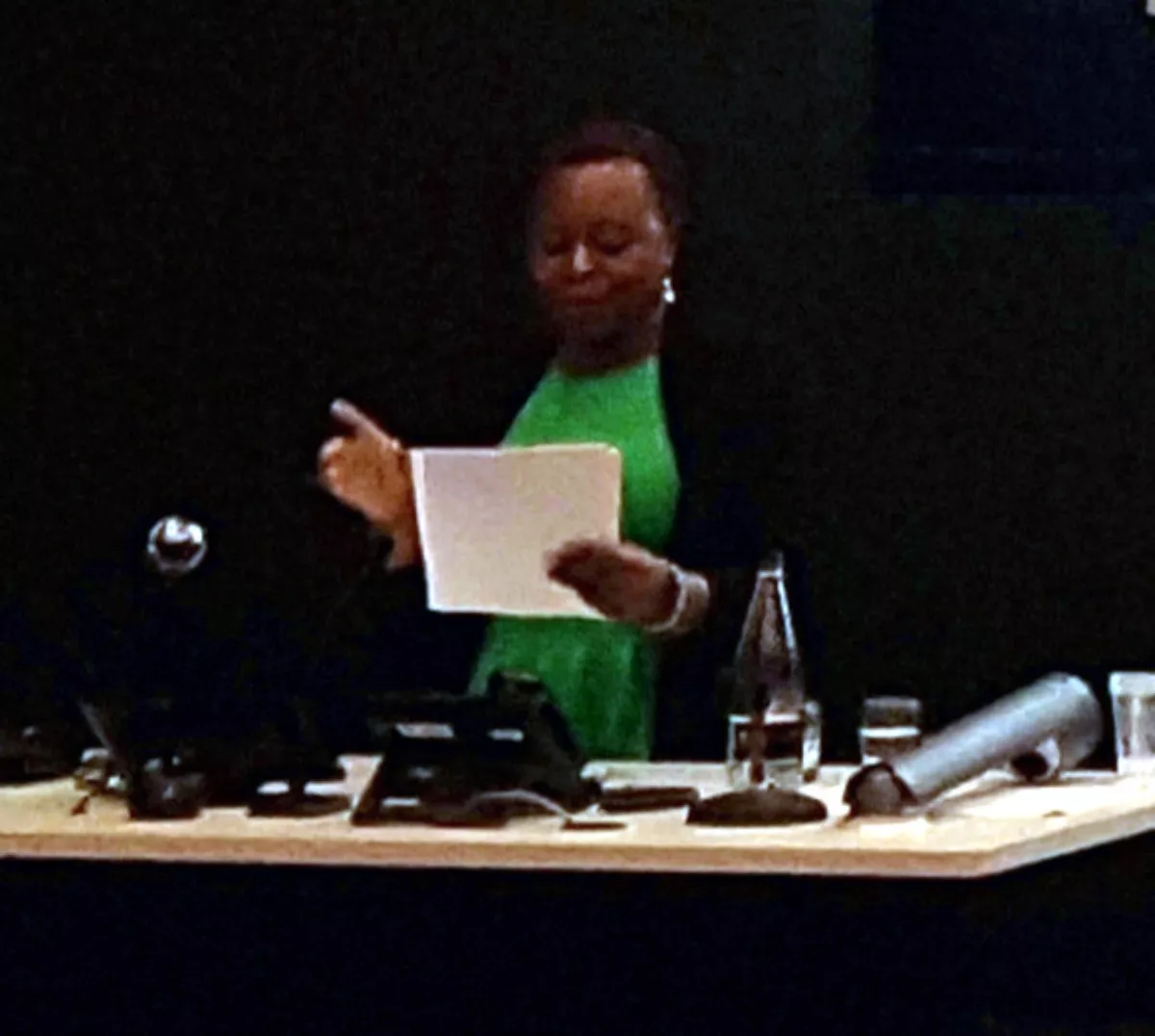 1.
1. Olivette Otele was previously professor of the history of slavery at Bristol University.

 1.
1. Olivette Otele was previously professor of the history of slavery at Bristol University.
Olivette Otele was vice-president of the Royal Historical Society, and chair of Bristol's Race Equality Commission.
Olivette Otele is an expert on the links between history, memory, and geopolitics in relation to French and British colonial pasts.
Olivette Otele is the first Black woman to be appointed to a professorial chair in History in the United Kingdom.
Olivette Otele is of Cameroonian heritage, and has been described as the "quintessential African European".
Olivette Otele studied at the Universite La Sorbonne in Paris, France, working on European colonial and post-colonial history.
Olivette Otele completed her Bachelor of Arts degree in literature in 1998, and her Master of Arts degree in 2000.
Olivette Otele received her Doctor of Philosophy degree from Universite La Sorbonne in 2005 for a doctoral thesis entitled Memoire et politique: l'enrichissement de Bristol par le commerce triangulaire, objet de polemique.
Olivette Otele's dissertation examined the city of Bristol's role in the trans-Atlantic slave trade.
Olivette Otele was appointed as a senior lecturer at Bath Spa University in 2013.
In 2018, at the age of 48, Olivette Otele became the first Black woman to be made professor of history in the United Kingdom, appointed at Bath Spa University She acknowledged that her promotion to the professoriate took longer because she has caring responsibilities as a mother to two children and because she is a woman of colour.
Olivette Otele announced her promotion from her active Twitter account to her 25,000 followers.
In October 2019 it was announced that Olivette Otele had been appointed as the first professor of the history of slavery at Bristol University.
Olivette Otele assumed her post in January 2020, and began a two-year research project to examine Bristol's connection to the transatlantic slave trade.
In spring of 2022, Olivette Otele left Bristol for SOAS, a shift she addressed in a Twitter thread that received much attention.
Olivette Otele is a Fellow of the Royal Historical Society, and a board member of Historians Against Slavery.
Olivette Otele is an executive board member for The British Society for the Eighteenth-Century Studies, a member of the Association for Cultural Studies, and a member of the Centre international de recherches sur les esclavages.
In June 2020, Olivette Otele was appointed as independent Chair of Bristol's Commission on Race Equality, which is an unpaid role.
For 2022, Olivette Otele is a visiting research fellow in African Canadian history with the Huron Community History Centre and the Department of History at Huron University.
Olivette Otele has written about cultural and collective memory and the memorialisation of the past.
Olivette Otele has published academic articles about Afro-European identities, including Frenchness, British identities in Wales, and what it meant to be British, Welsh, and Black.
Olivette Otele has participated in several major research grants looking at the African diaspora.
Olivette Otele looks at the way the societies of Britain and France address citizenship.
Olivette Otele has authored three books, and contributed to several other books.
Olivette Otele published L'histoire de l'esclavage transatlantique britannique: des origines de la traite transatlantique aux premisses de la colonisation in 2009.
The publisher Hodder bought the exclusive rights to the audiobook version which will be narrated by Olivette Otele and released alongside the hardbook publication.
Olivette Otele's edited volume, Post-Conflict Memorialization: Missing Memorials, Absent Bodies, was published in 2021 by Palgrave Macmillan.
Olivette Otele has written for the BBC's HistoryExtra, The Conversation, and Times Higher Education.
Olivette Otele regularly contributes to other press, television and radio programmes, including The Guardian, Sky News, The Sunday Times, Elle Magazine, Huffington Post and The New Yorker.
Olivette Otele is part of the John Blanke Project, a collaboration of artists and historians celebrating Black Tudors.
Olivette Otele spoke at the 2018 Winchester History Weekend, How Africans Changed Early Modern Europe.
Olivette Otele considered outstanding Africans and Europeans who are not otherwise remembered in popular history books.
Olivette Otele says the book that has had the greatest impact on her is Nations negres et culture by Cheikh Anta Diop.
Olivette Otele speaks French, English, some German, and three Cameroonian languages, Ewondo, Eton and Bulu.
Olivette Otele is leading the project "We Are Bristol: Reparative Justice Through Collaborative Research" at the University of Bristol.
Olivette Otele appears at number 69, alongside Abisoye Ajayi-Akinfolarin, Nimco Ali, and Uma Devi Badi.
Olivette Otele gave the keynote address at the Social History Society Annual Conference, University of Lincoln, 11 June 2019.
In 2020, Olivette Otele was listed by Prospect as the sixth-greatest thinker for the COVID-19 era.
Olivette Otele commented on the media attention this brought as an "overwhelming pressure to be the face of diversity and to solve racism".
Olivette Otele was photographed to honour the contributions of Black, Asian and minority ethnic staff, students and alumni, at Bristol University.
In 2022, Olivette Otele received an honorary doctorate from the Faculty of Arts and Science at Concordia University.
Olivette Otele was elected as a Fellow of the Learned Society of Wales.